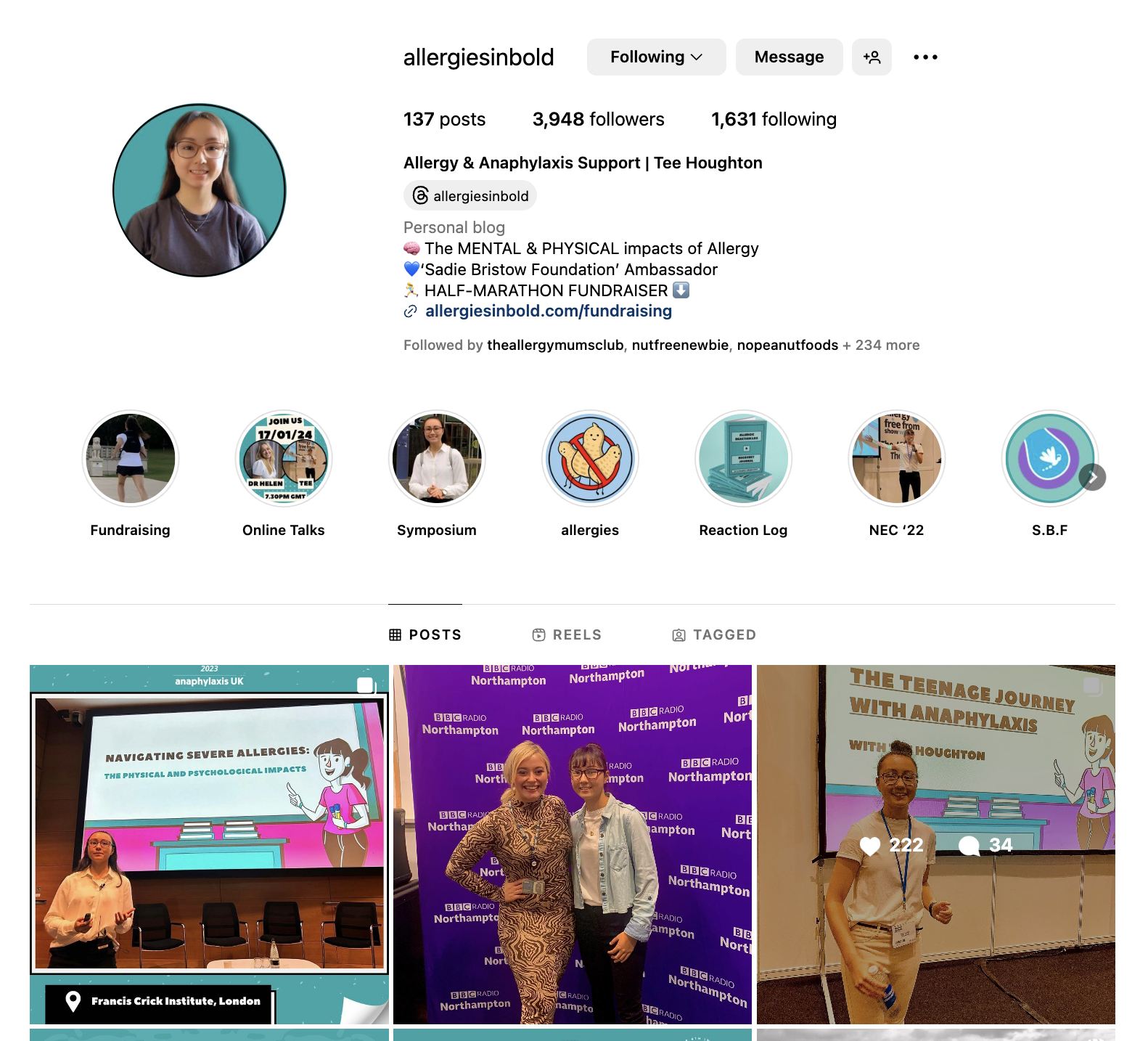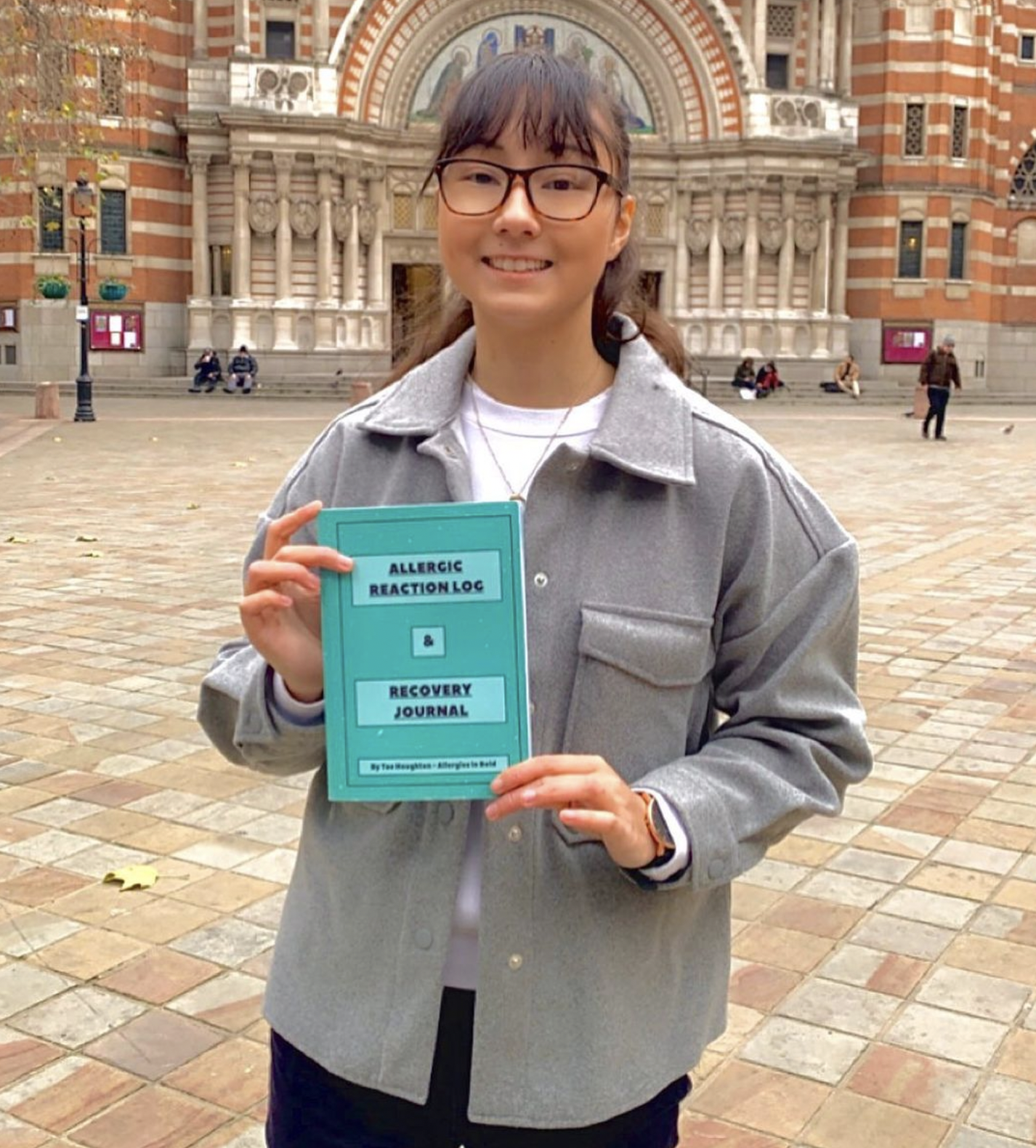Living With Exercise-Induced Anaphylaxis | Tee Houghton - Allergy Interviews Ep #3
For the third instalment of our Allergy Interviews series, I chatted with 19-year-old Tee Houghton - otherwise known as ‘Allergies In Bold’. Tee lives with a range of allergies from environmental factors such as dust, animal dander and pollen to foods such as shellfish and also exercise-induced anaphylaxis.
Watch of the full interview recorded below, or read through some of the highlights written in this blog.
“When did you first find out about your allergies?”
“So this was a severe reaction I had in year 11.
In the morning, on the way to school I sat in the backseat of a car, which recently had a dog in - So it wasn't a brilliant start to the day.
It was then a high pollen count as well and we were running late to school. The grass was recently cut on the field, so we decided, as we're running late, let's just sprint across this field. Now also bearing in mind, I had a piece of toast in the morning. That wasn't my intention to go sprinting 100 meters before school. And again, even at the time, we would have thought, right, 100 meters, how was that going to cause a severe reaction?
I then got into school and it was hot. Also, given I ran quite, quite fast, it was it was a hot environment, which then caused me to know the reaction to speed up in a sense. And I had full body hives, similar to the first reaction I had, and ws wheezing. I took my inhaler and an antihistamine, but it had no effect whatsoever.
At the time - I'm quite ashamed to say - I just thought I'd brush it under the carpet. I wouldn't tell my teacher, I wouldn't tell my friends. And it wasn't until I started to feel quite wobbly on my feet and they noticed that, they couldn't distinguish my face, like it was so swollen, they didn't know what to do. So then I got a teacher to help me, she then got the first aiders who injected my adrenaline auto injector. And when the paramedics arrived, they gave me some more medication.
I think that was the turning point for me where I knew that if I have a reaction, if I have these symptoms, telling somebody, a teacher, a friend, is the first port of call - because I look back and I think - if I had waited longer, what state would I be in? Would I have been conscious or, you know, how unwell would I have been?”
Tee runs an instagram page called ‘Allergies In Bold’ where she speaks from her experiences and advocates for awareness.
“What did it feel like to use an EpiPen (adrenaline pen)?”
“Having that EpiPen, it was scary, but I looked at myself and my friends looked at me and said, there is no time to be scared. You need to look after yourself and take your medication and at that time, that's all I wanted. I wanted to feel better. I was in quite a lot of pain as well and I just wanted that 10 second shot of adrenaline. If that's what it's going to take to reverse these symptoms, I was willing to have it.
I really do understand if anybody (not just teens) - if they have that hesitation to use it because it's a needle or it might hurt, you know, lots of worries can go through your head. But like I touched on for myself, I needed it.
The only side effects that I got was like a racing heart and like shakiness, but that compared to the symptoms I was having, it was worth it.
It's like you say, adrenaline is naturally in our body and you'll find you'll have a racing heart rate, you'll feel a bit shaky if you are nervous or excited for something. So those symptoms weren't foreign to me, but yeah, it was definitely worth it rather than the symptoms I was having.”
Tee created the ‘Allergic Reaction Log & Recovery Journal’ to help those with allergies navigate severe reactions.
“Do you have allergy anxiety?”
“I think sometimes that's the impression that I give off on my page (@Allergiesinbold)) is that I can bounce back from reactions or different allergy challenges. That's certainly not the case. It has impacted me a lot.
But in terms of allergy anxiety, I don't worry: ‘What if I have a reaction’ or ’Am I reacting’ - That's not what I really worry about. My main worry is if I do have a reaction, who and what am I impacting? Will I impact the school lesson? Will I impact work or business? I think it stems from a deep rooted feeling that I'm a problem. I feel that I'm confident in managing my allergies as an individual. But what impact is it having on other people and how are they going to react to the situation if I were to have a reaction? That is where my anxiety or worry comes from.”
In March 2024, Tee is running the London Half-Marathon (in spite of her pollen and exercise-induced allergy condition), fundraising for the Saide Bristow Foundation and Natasha’s Allergy Research Foundation!
“How can you be so positive about your allergies? “
“I feel allergy awareness has grown massively. I think through the support of what you do with your Anaphylaxis Kitts, as your company, and I could be here all day naming charities, advocates, organisations, you know, everything that we're doing, we're driving that change. We have made such a difference already.
And I feel in some ways I'm great for my allergies for helping me develop as a person. I'm much more understanding and I try and view things from different people's perspectives. You know, everybody has something to deal with. I feel very strongly about that. We all have something and for me, that's allergies. It does help you develop as a person and in that sense I am grateful that if anything, my allergies, all the challenges, coming away from that, I'm almost a different person. So there are positives to it.”
Tee often creates helpful infographics about allergy related topics to share with her followers.
“Is there anything else you feel like you want to touch on in terms of allergy or adrenaline that we haven't covered yet?”
“Ooh, something that popped to my head when you asked what I wish we would know is when people talk about one allergy being more severe than the other - in reality, it's the reaction that you should look at the severity of, rather than the allergen.
There was a situation similar where there are three people who were prescribed adrenaline auto-injectors: One boy had peanut allergy, one had a milk allergy, and the other one had an allergy that wasn't in the top 14. And there was talks of ‘we really need to protect this this child with the peanut allergy’ - and I was thinking, they all carry auto injectors? It doesn't matter!
Just because a peanut allergy is more common doesn't make it more severe. They are all at risk of anaphylaxis. At the end of the day, we're putting our life in their hands and for them to understand that difference, it's very important.”
Tee is a regular speaker at events and offers inspiring stories to help promote positive living with allergies.
I really hope you gained something from reading about Tee’s story, and are enjoying this allergy interviews series. Make sure you check out the other interviews - and if you’re interested in our Anaphylaxis Kitt service, please make an enquiry through our website contact form.





